
Welshj
Members-
Posts
309 -
Joined
-
Last visited
Content Type
Profiles
Forums
Articles
Gallery
Downloads
Events
Everything posted by Welshj
-
first trial towards forging a conrod
Welshj replied to BeaverNZ's topic in Power Hammers, Treadle Hammers, Olivers
Ooh... one of my favorite movies, and stories. That man was dedicated to his machine!!! -
As am I. I walked in blind- to troubleshoot a "non-working brand new space heater". Climbed a ladder in a corner, and stood looking at/into a service port as he powered it up. Watched it cycle, fan kicked on, gas valve opened and ignitor lit up. Four inches from my face. If the valve had not done its job and stopped it from opening on a full non-regulated pressure... I don't know for sure what would have happened, but I'm sure it wouldn't have been a good day for me.
-
Latticino - re-reading and thinking... I owe you an apology. It was a long day that day, and I was tired and cranky. I didnt mean to be that short, and I'm not usually. Sorry sir... I wasn't suggesting that a residential natural gas supply wouldnt run a forge, but instead- that using the/some/any of the equipment in a heater like that probably or likely wouldnt. Wilson- i think what i was trying to get at, and not doing in a very clear fashion... is that i don't see attempting to use the original valve, ignitor, controls etc... working without a major amount of work. Theres alot of variables in equipment like this... from water heaters, to furnaces, to boiler systems. But they all have similiar components and functions. And without your specific heater in front of me- Here's some basics why. The gas valve- basic commercial/residential- no matter what pressure they operate at... as I said they have safeties built in. You may be thinking or seeing that as a benefit- I see it as a downfall and hindrance... the best machine operates with the least moving parts. There can be a basic thermo couple, that detects the presence of a pilot flame, that will not allow the valve to open unless it's in a certain heat range. That thermo couple is rated for a certain range... at a forging heat range- it probably wont last long at all. I've seen them burned/corroded up from just months in a simple pilot flame. A heavier more industrial one might last, might not. Some have photoelectric eye sensors that detect ignition and or flame. Electric controls- in for example, a home furnace- you have combustion/exhaust air blower pressure switches, temp limit switches, flame sensor, that all work together to complete a circuit to keep the valve open and supplying gas. If one drops out, no gas. Control, or circuit board- exactly that. It controls timing the combustion/exhaust fan(s) to start the operation. Then when sensed, it will ignite. Then, in a furnace, at higher temps, it kicks on a blower fan. Without the proper voltage, limit switch, sensor readings, etc... getting a control board to work without certain parts, or the wrong parts in the loop... not impossible, but difficult... and well above my knowledge of electronics. Limit switches. Any heater of any type has temperature limit switches in it. They're designed to operate within a certain temperature range. Above or below that- they drop out, shutting down or cooling the system. I would think that they're not going to get you to forging temps. Ignitors- depending on what type- pilot light, piezo/arc style, electric glow type... electric types are designed to operate on a certain voltage, often for a short period. They can be very fragile and easily broken... they can be under powered by lower voltage and not work. Over voltage, and they burn up. So, when I said that using the original controls wouldnt work- I had in my head why, but didnt figure out how to explain. Your heater, like any other- gas, electric... is designed and built to operate within a certain temperature range. Safety protocols and manufacturer specific equipment keep it from being a law suit in process. The equipment and parts in are designed for a specific use, and using them in a different way can be a deadly, or costly mistake. Let alone a headache to figure out. Building a forge out of that heater case, properly insulated can be done... if it were me- the case is the only thing I'd use. Period. But, other than a financial... consideration... being that you have the parts on hand- I personally, with access to that kind of gas line and pressure... would research a little more and figure out how to efficiently use it. Turn gas valve on, light fire, heat steel... beat steel is much less of a headache to deal with. I built a forced air burner in my forge. It has the tank gas valve, a regulator, a secondary inline gas valve closer to the forge for safety shut off. Its fed by a squirrel cage style industrial blower that is almost too much air for it. It plugs directly into an extension cord. I kept it simple as possible, getting information and help from the folks here. Got me forging much faster, and much cheaper.
-
Never said he planned on switching- just used it as a referance for... general pressure regulation. I spent 4 yrs working as a hvac and plumbing tech here in rural nw ohio. Mostly rural, alot of residential propane use. Everything is regulated before entering the residence... and he was talking about using the original gas valve and control parts, the original flame tube from the heater to heat the interior... planning on changing orifices to better the flame. Every residential gas valve, propane or natural gas (in the last 40-50yrs or so.) has electric, and pressure safety over rides built into them. I literally just went through this exact problem with a friend trying to hook up a space heater in a pole barn- directly to a propane tank, with no regulator at the tank. He thought that the gas valve in the heater would regulate the pressure... and wondered why he couldnt get it to fire up. But... then again. I'm just trying to help someone not burn their house down or die. I no longer have an opinion. Good luck wilson.
-
A 3/4" line is pretty standard input size for a household furnace or gas water heater. Most are actually 1/2" pipe on the gas valve... they're reduced down to it. As for keeping the gas valve- and controls- no they wont work. They're built with a safety feature in them. They will shut down the valve/furnace/heater in two gas conditions- either over, or under pressure. Most are regulated in bars, or inch pressures. To reach forging temps, that's nowhere near enough fuel supply. Using a high pressure- 20-30 psi regulator with a normal heater style gas valve will over pressurize the valve and cause it to shut down the solenoid and close off gas supply. The fuel orifices in it are designed for low pressure -household gas propane pressure is normally around 3 bars ? in the US... to maintain a nice low, blue 1" or 2" flame on that flame bar/tube. In my opinion... I'd plan on scrapping everything inside- and build your burners all new with forge pressures and temps in mind. Nothing in that system is designed, or built to come anywhere near 2,000 degrees. EVER. If they were to hit 500 degrees, I'd be amazed.
-
What did you do in the shop today?
Welshj replied to Mark Ling's topic in Blacksmithing, General Discussion
Got my 2x72 belt sander picked up today. My little shed/shop is a mess right now... packed tight. But I fit it in, and fired it up. Got my first real forged blade rough ground to profile. -
Spent the day helping my little brother clean his garage. He gave me a drill press, a 6" bench vise, 20 or 30 some files, and a toolbox they were in. Along with a bunch of firewood. On the way home, I picked up my belt sander from my buddy. A long day, but great one!
-
Another possibility- I used to work for an hvac shop, the metal cans/bottles of r22, and 410a refrigerant came in metal containers. When empty- we usually had a hard time getting rid of them. I'd take them home and use them for shooting targets. Now, I no longer work there... I'm looking for a couple myself to make a smaller gas forge body from. But, thinking to cut the top off and fill... it's prolly less than 5 gal bucket volume, but still might be useful?
-
You can find them. My dad offered me one free a year or so ago- and having no use then I declined like an idiot. On getting into forging, I soon realized the need for one and started looking. I live out in the "country", and coming home about a week after I started looking- found two for sale by the roadside. $120 for both was a great deal. Still in certification range.
-
I have only a couple things to add to the above responses... Willem, one reason you might not be getting fuel economy on your forge is your 20lb tank- is the same reason I wasnt getting time out of mine. The 20 pounders have an overflow restriction valve in them. They start to get cold and frost up pretty quickly. I'd lose pressure, and forge temperature after about an hour of use with mine. I followed the advice of several smiths here- and upgraded to a 100lb tank. No valve, no more frosting up, and have never looked back. I still haven't run low on pressure or gas yet. I run a forced air burner, usually at around 2-5 psi. Secondly, for your age- you present to be very well spoken, a very clear communicator, and polite young man. It's a rare trait these days. Keep it. Add hard work and humility to the mix, and you'll find you go far sir. Looking forward to seeing some of your work as you go along!
-
Jason batdorf! - Delaney knives. He's a facebook friend, hoping to spend some time with him once this coronavirus settles out. He lives not too far from me. That's awesome!
-
The Blacksmith's Image
Welshj replied to Archie Zietman's topic in Blacksmithing, General Discussion
I wonder how many decades it took- to both... develop that eye for an edge/adjustment... and to wear that (looks to be oak) hammer handle down to his hand shape? I feel like I just watched several decades of history in a few minutes... -
I have used an angle grinder for a myriad of things. I cut off the entire lower 6" of body panels on a '70 vw bus for replacement. I've used them to cut out and grind many a stock removal knife. I've used it to cut off and replace a busted and jammed steering knuckle on a truck. I've shortened hundreds of bolts for projects. I've cut all the material to build a $70,000 LED sign frame with one. Once you get used to it... you'll never understand why you didnt have one before.
-
Depending on how big the pieces of granite were- you could break it up into smaller chunks, and cast it into a clear resin. Shape as best as possible, and epoxy it to the tang?
-
Howell is a bit of a ways up from me... but I'm in wauseon, ohio just about 30 mins west of toledo. There's a locally owned small shop out here in my area that ive heard sells coal, and coke. Mainly for a very few of the old farms, and the very few really old farm houses that still heat with- around here. I'd heard about them awhile back, and could easily find out for you if they're still in business. If you're looking for a fair amount- it might be worth the drive. Dennis Coal & Stove
-
Stories behind smithy/forge names...
Welshj replied to elkdoc's topic in Blacksmithing, General Discussion
I don't really have it nailed down yet... but I'd joked about naming my shed the "fair weather forge", as I do my work outside in the doorway so as not to set the wood framed shed on fire. Here in northwest Ohio- the winters can get pretty cold, and the midwest weather tends to change on the hour sometimes... hence, the fair weather reference! -
How did you get started blacksmithing
Welshj replied to don't tread on me's topic in Blacksmithing, General Discussion
I've kind of read through this thread for awhile... it kind of piqued my interest. Anyways... here's my take. I've always been interested in the old school methods. I grew up with a father who was a master mechanic... so my first introduction to metal was of the four wheeled variety. I got into anything and everything mechanical, and artistic. Took wood shop in school every year I could, and excelled in it. Used to love watching bruce lee, jackie chan, and the old school martial arts movies which were very popular when i was a kid. That got me interested in knives and weapons. Later, as I got older... very late teens.... my car love blossomed into restoration/repair, and like bluerooster- I learned to move and push metal by hand and hammer- dolly working body panels and replacing them, which led to learning welding, brazing and soldering. Started making knives for friends and family using- other than forged methods when was in my 20's-on and learned more about tempering and treating metals as I worked in a heat treat foundry, and then an aluminum casting foundry in michigan. I went into the us army at 24 yrs old... and stationed in Europe, I saw and toured a blacksmith shop in germany. It fueled my interest again... but I couldn't practice much of anything craft-wise while on duty, missions and deployments... let alone set up a shop in government housing... lol. Now, after all these years at 47 years old... I'm beginning to learn and do what I'd been interested in for so long. Like so many others, it was knives that got me into it... but, I want to be able to do more than just blades... to be able to make what I need. I love that concept of self reliance. And, finally having a place of my own to do what I want- I've slowly started acquiring the tools and trying my hand... it's still slow, but steady. I've always said that I know a little about alot of things... as I picked up many different skills over the years... but I don't know everything- about anything! -
Bjorn makes sharp things. My beginners log book
Welshj replied to Bonnskij's topic in Member Projects
Wait... so two questions- You mean all those soldiers I used to see putting gas into diesel (jp8) army trucks weren't right? And... so 100 layer damascus with four different steels isnt a good goal for my first forge weld? Bonnshijk- congratulations on your first step... it looks much nicer than my first attempt. Trust me. -
There are ways around it. It's probably not the best example, but I dropped down from 3.5 inch pipe to a 2 inch pipe- using an angle grinder with a cutoff wheel, and a mig welder. Just took time. Cut, bend, weld, cut bend weld.
-
Second post in... and you fit "intracranial flatus" into a conversation?? You sure wont fit in around here... Welcome!
-
^ he's right you know! I used to do alot of body work on cars, so I like to use an air powered DA sander. I start out with 220 grit paper, then go to 320, 600, and finally 800 grit paper. Then I take it to a cloth buffing wheel on a 6" bench grinder with polishing rouge for final polish. Ran out of 600 and 800... so that one got hand polished with 1500 paper before the wheel.
-
^ see? Well done for a first attempt. The more you do, the more you'll pick up and figure out what makes it easier and with better results. Take your time and dont get frustrated easily... In the army, one of my senior drill sergeant instructors told me something that I'll never forget. "Strive for perfection... but accept completion." His intent was that it'll never be perfect, but work for it, towards it as your goal. Accepting completion meant to be good with getting the job done correctly. He explained to us that in completing it- we made the goal. That by getting caught up in having to have it perfect- can cause you to never get it done at all. Remember that cleaver I posted? One step closer....
-
That'll work! You just stepped off the top of the avalanche run, and you're stuck going downhill from there!!! Guarantee that wont be your last blade either.
-
What did you do in the shop today?
Welshj replied to Mark Ling's topic in Blacksmithing, General Discussion
-
Well said George. This memorial day I'll be thinking of those I knew that we lost in iraq. Ssg Mark Lawton SGT Jason Buzzard CPL Heath Pirtle And lastly, unfortunately one of my own platoon who took his own life after coming home from iraq. SPC Robert Utter RIP my brothers.
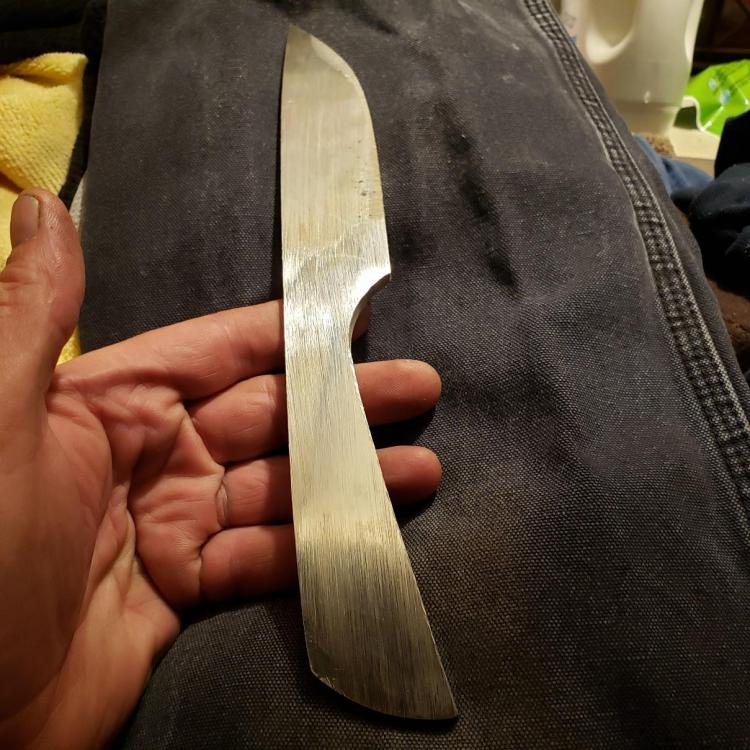
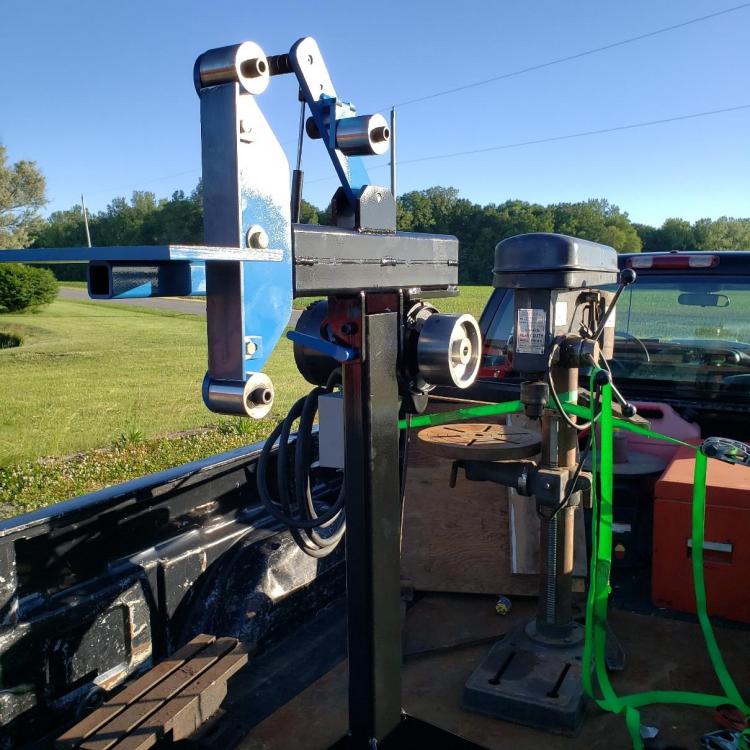
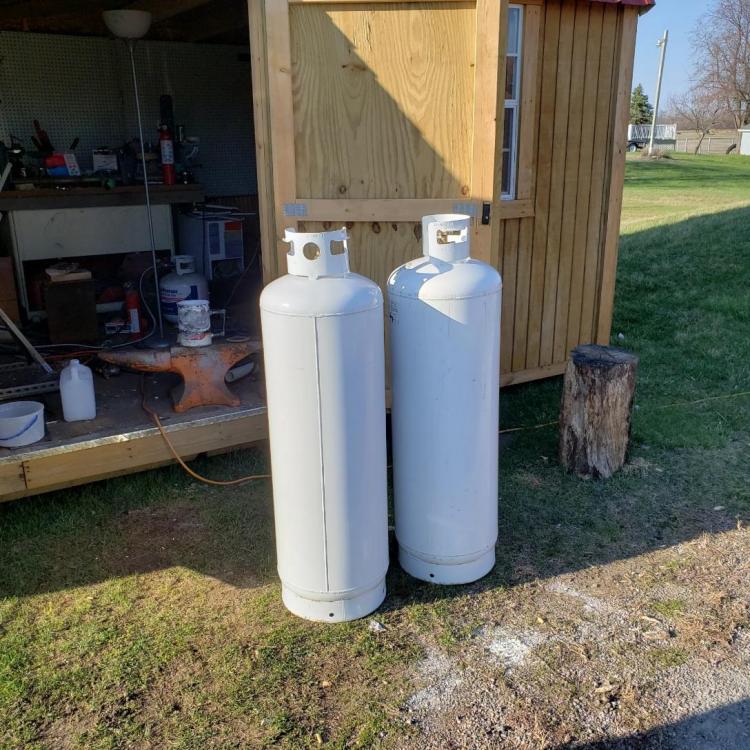
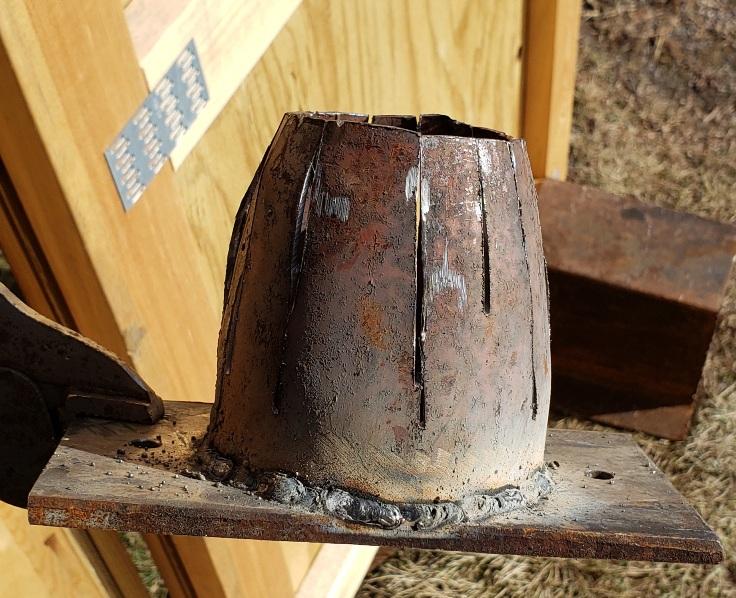
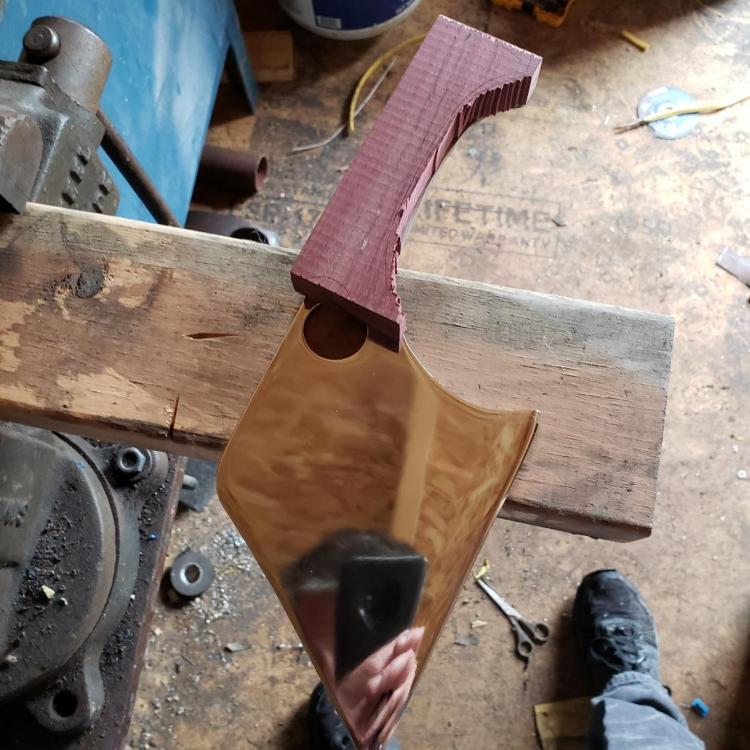
.thumb.jpg.232e719a0d1cfb86a79b6864a9ec7717.jpg)